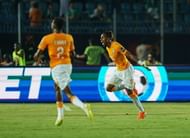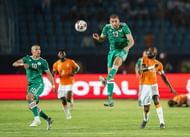In what was a keenly contested match at the Suez Stadium, Algeria edged past Ivory Coast 4-3 on penalties after both sides could not be separated after 120 minutes.
Sofiane Feghouli had put the Desert Foxes ahead after just 20 minutes, placing an emphatic finish into the corner after a beautiful run and cutback from Rasi Bensebaini on the left flank.
However, Kodjia was on hand to equalize for the Elephants off an assist by Wilfried Zaha and despite both teams' best efforts, neither side could find the back of the net again.
Their victory means Algeria are through to the last four where they would take on Nigeria in Cairo. In this piece, we shall be highlighting three talking points from the quarterfinal fixture in the African Cup Of Nations.
#1 Algerian Golden generation finally living up to promise
Between 1980 and 1990, Algeria were one of the bonafide heavyweights in the African continent, as led by the great Rabah Madjer, they made it to the semifinals of the Nations Cup on five occasions in that decade. However since then, they have made it to the semifinal on just one occasion; in 2010.
The last few years have seen Algeria produce some of best players on the continent; world beaters who can hold their own anywhere on the planet.
Riyad Mahrez, Islam Slimani, Sofiane Feghouli, Yacine Brahimi to name a few, are among the Algerian players collectively termed as the 'Golden Generation'.
This crop of players always entered every tournament as one of the favorites, but always struggled to meet expectations, shambolically failing to make it out of the group stage in 2017.
However the ongoing tournament seems to be one where they have finally hit top form, as the players all play with the conviction of going all the way.
This is the first time this team of players are going this far in the tournament and on the strength of their performances so far, this night will be the time when a talented bunch of players finally fulfil their promise.
#2 Ivory Coast play their part in making this an exhilarating fixture

After the round-of-16 fixtures were concluded, many picked the clash between Algeria and Ivory Coast to be the biggest one of the quarterfinals stage.
The quality of marquee players on both sides meant that a keenly contested fixture was expected and while most high profile matches in knockouts rounds of tournaments usually fail to live up to the hype, this one proved to be the exception.
Algeria, as expected, started the brighter of the two going ahead in the 20th minute. They had a wonderful opportunity to double their lead right at the start of the second half, only for Baghdad Bounedjah to smash his spotkick against the post.
Jonathan Kodjia showed no such profligacy at the other end, displaying great composure and technique to draw Ivory Coast level in the 62nd minute.
For the entirety of the game, there was precious little to choose between both sides, as the two teams provided all round drama, physicality and end-to-end action for all to savour.
The closeness of the tie is best exemplified by the fact neither team could be separated after 120 minutes of action, while there was also drama and intrigue in the penalty shootout.
Even though Ivory Coast have seen their dreams of a third Nations Cup title ended, they live with their heads held high having given their all at the Suez Stadium.
#3 Algerian defence finally breached

Heading into this fixture, the Algerians had gone an impressive four matches without conceding right from the group stages through the second round.
Impressively, the North Africans had scored 10 unreplied goals in that run, but despite holding out for so long, Rais M'bolhi was finally beaten in the Algerian goal after 427 minutes of action.
This meant that Algeria failed to match the tournament record of going six matches without conceding which was achieved on two occasions by Ivory Coast in 2012 and Cameroon in 2002 and both sides went all the way to the final on each occasion.
Algeria's defensive solidity has played a major role in getting them this far, but with forwards like Willfred Zaha, Jonathan Kodjia and Max Gradel, Ivory Coast's firepower ultimately proved too much for them and this saw their back line breached for the first time in this competition.
